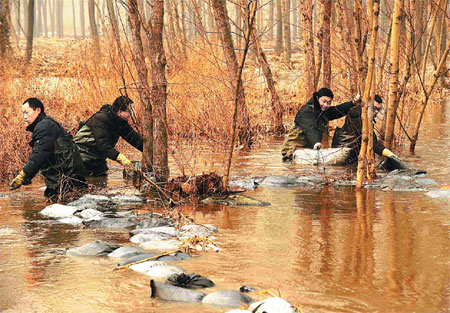Chemical leak into river puts focus on plant
Updated: 2013-01-11 07:25
By Wu Wencong and Sun Ruisheng in Shanxi and Peng Yining in Beijing (China Daily)
|
|||||||||||
Although the Handan government confirmed on Tuesday that the water quality from a local reservoir, the source of the city's drinking water, has not been affected, questions remain as to whether the chemical company and Changzhi government concealed the truth from the public.
Wang Junyan, secretary of the Party committee at Tianji Coal Chemical Industry Group, said the delay in reporting the leak came about because the company underestimated the quantity and the potential damage of the spill. Wang said initial estimates suggested that 1.5 tons of aniline had leaked from the plant. In fact, approximately nine metric tons entered the river after 39 metric tons flowed into the abandoned reservoir.
Zhang Bao, the mayor of Changzhi, issued an apology for the delay during a media briefing on Jan 7.
Production suspended
There were few workers to be seen in the area surrounding Tianji Coal Chemical Industry Group's plants on Wednesday. When questioned, security guards patrolling behind the locked gates said production has been suspended.
"It must be true, because there's no smoke coming out of the tallest chimney," commented Chen Yuting, a 50-year-old taxi driver. "It's likely to cost the company a fortune. I heard that it costs tens of millions of yuan to restart all the equipment."
 |
|
Workers place bags of activated carbon into the water to absorb contaminants in Yuecheng reservoir in Handan, Hebei province, after it was polluted by aniline that flowed in from Shanxi province. Zhu Xudong / Xinhua |
Chen, who has been carrying passengers around the region for eight years, said that sometimes when he drives past the plant area, he can smell a sharp, unpleasant odor.
On the road running alongside a small ditch east of the plant area, a series of newly erected bulletin boards warned locals that neither people nor livestock should go near the ditch or use the liquid inside.
The ditch widens when it reaches Panshitou village in Huangniuti town. More than 30 villagers, led by the village head, were digging at the light-yellow ice in the ditch using iron picks and shovels.
A sharp odor rose as a yellow liquid became visible below the ice, causing people to cough, but the villagers, none of whom wore breathing apparatus, seemed indifferent and continued to dig.
They said they didn't know about the spill until they saw the news reports on Jan 5 and 6. "People don't usually come here. While it's fine in winter, the odor is much worse in summer," said one villager.
Further downstream in Huangniuti Reservoir, which held up to 30 metric tons of aniline from the spill, several large earthmovers were gouging paths in the frozen ground to allow the trucks carrying activated carbon to reach the far end where the ice has formed. Hundreds of workers from Lu'an Group, the parent of Tianji Coal Chemical Industry Group, were drilling holes in the ice and pumping out the liquid underneath.
"Both the ice and the liquid containing aniline will be shipped to Tianji's emergency pool and will be further treated after melting," Wang Fucun, head of Tianji Group's water supply plant, told Xinhua News Agency. The water will be used as industrial circulating fluid when its quality eventually conforms to national standards.
Related Stories
Mayor apologizes for pollution in N. China River 2013-01-07 13:46
Chemicals contaminate N China river 2013-01-06 13:12
Legal action launched over polluted water 2013-01-10 03:06
Pollution leads to water supply being cut 2013-01-07 07:31
Today's Top News
Police continue manhunt for 2nd bombing suspect
H7N9 flu transmission studied
8% growth predicted for Q2
Nuke reactor gets foreign contract
First couple on Time's list of most influential
'Green' awareness levels drop in Beijing
Palace Museum spruces up
Trading channels 'need to broaden'
Hot Topics
Lunar probe , China growth forecasts, Emission rules get tougher, China seen through 'colored lens', International board,
Editor's Picks

|

|

|

|

|

|





